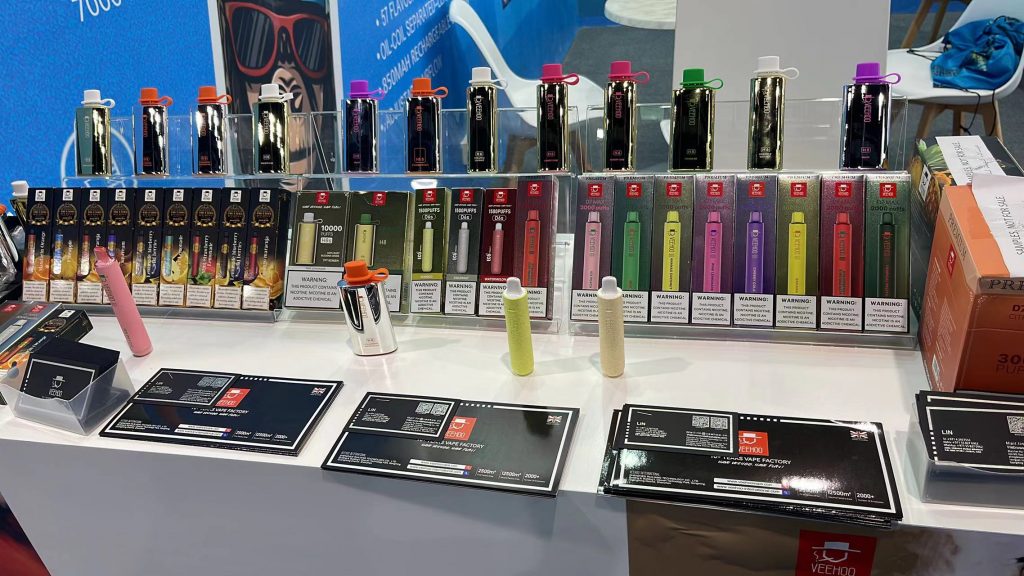A new study funded by Cancer Research UK and organized by researchers at University College London (UCL) suggests that the UK government is currently considering a ban on disposable vapes, which could deter those trying to quit using them.
The study, published in the journal Public Health, looked at survey responses from 69,973 adults in England, Wales and Scotland between January 2021 and August 2023.
The researchers found that the proportion of adults using disposable vapes increased from 0.1% to 4.9% during this period. The increase is particularly pronounced among 18 to 24-year-olds, with 14.4% using disposable vapes in 2023, as well as current smokers (16.3%) and those who have quit smoking in the past year (18.2%).
Relatively few people who have never smoked regularly use vapes (1.5%), but use is higher among 18 to 24-year-olds, 7.1% of whom use disposable vapes and have never smoked regularly.

“Our research shows that banning single-use vapes would affect around 2.6 million people in England, Wales and Scotland,” lead author Sarah Jackson, from the Institute of Epidemiology and Healthcare at University College London, said in a statement.
“This group includes approximately 316,000 young people aged 18 to 24 who currently use disposables but have never smoked regularly. However, it also includes 1.2 million people who currently smoke and would benefit from switching entirely to vapes , and an additional 744,000 former smokers who may be at risk of relapse.”
“While banning disposable vapes may seem like an immediate solution to reducing youth vaping, it may have serious unintended consequences for smokers.”
“In the context of a ban, it is important to encourage current and former single-use vape smokers to switch to other types of vapes rather than return to smoking.”
“In addition, we found that single-use cigarette use is particularly prevalent among recent quitters with a history of psychosis. This group may require targeted support to help them avoid relapse.”
The team used data from the Smoking Toolkit Study, which conducts separate monthly interviews with 2,450 adults in the UK (representative of the general population).

They found that adults living in England were significantly more likely to use disposable vapes than in Wales or Scotland (5.3% vs 2% and 2.8% at the end of the study), and among those in lower (vs more) social status (6.1% vs. 4.0%), among those with (vs. without) children (6.4% vs. 4.4%), and among those with (vs. without) a history of mental illness (9.3% vs. 3.1%).
The researchers note that until recently, few adult vape users in the UK used disposable vapes, but in 2021, new disposable vapes entered the market with designs and brands that attracted young people, leading to a rise in disposable vapes. Usage is rising rapidly in the UK and elsewhere. These products can be found everywhere, such as in corner stores, and are sometimes promoted through colorful displays in-store.
While they are easy to use and have low upfront costs, they have also become an environmental issue, with reports that millions of these devices are thrown away every week in the UK.
“Action is necessary to reduce disposable vapes among young people who have never smoked,” said senior author Jamie Brown, professor at UCL’s Institute of Epidemiology and Healthcare. “However, the trade-offs need to be carefully considered. A ban May deter those who are trying to quit smoking from using vapes and may cause relapse in those who have already used disposable cigarettes to quit smoking. Cigarettes are far more harmful to our health and are not yet banned. Banning disposable vapes may would send a signal to many people that these products are more harmful to our health, or that their harms are comparable to those caused by smoking. I favor a range of alternative policies, first, combined with a rapid assessment of whether they are adequate Reducing youth vape use.”
In the paper, the researchers outline additional measures to strengthen regulation of disposable vapes that could reduce the risk of unintended consequences, such as causing relapse in ex-smokers.
These include banning brands that appeal to children (e.g., bright colors, sweet names, and cartoon characters), banning the promotion of vapes in stores, placing vapes out of sight and reach of children, and An excise tax is imposed on disposable vapes, raising the price to the same level as the cheapest reusable vapes. Defining single-use products can be problematic, so minimum unit pricing may be a more straightforward option that reduces their affordability and can be implemented quickly.
The researchers noted that their data may underestimate the popularity of disposable vapes. This is because respondents were asked which type of vape they primarily used, so people who used disposable vapes as a secondary product were not captured.
In addition to Cancer Research UK, this research was supported by the Prevention Research Partnership UK.

Veehoo vapes, a brand with eleven years of experience as an vape factory, advocates scientific supervision and emphasizes the importance of providing reliable alternatives. Banning disposable vapes may be too extreme a response, and scientific regulation can better balance the needs of smokers and public health concerns. Veehoo vapes are committed to providing safe, reliable quality vape products and supporting regulatory agencies in strict management of the vape market.
Veehoo vapes emphasize that scientific supervision should include reviews of product quality and safety to ensure that the vapes used by consumers meet relevant standards. They advocate the establishment of a comprehensive regulatory framework, including age restrictions, product labels and warnings, and prohibitions on sales to minors, to protect public health and prevent minors from using vapes.
While the findings raise issues that may arise from banning disposable vapes, Veehoo also highlights the importance of protecting minors. They believe that restrictions on the purchase and use of vape products by minors should be strengthened to prevent their abuse and addiction. In addition, Veehoo vapes also advocates joint efforts with all parties, including governments, schools and families, to strengthen education and publicity among teenagers and improve their awareness of the risks of vapes and smoking.
Taken together, research suggests that banning the use of disposable vapes may hamper smokers’ efforts to quit smoking. On this issue, Veehoo vapes advocate scientific supervision, provide safe, reliable quality vape products, and support strict market management. They emphasized the establishment of a comprehensive regulatory framework to protect public health while strengthening the protection and education of minors. Through scientific regulation and comprehensive measures, we can balance the needs of smokers and public health concerns, provide smokers with reliable alternatives, and reduce the risk of minors abusing vapes. Such comprehensive efforts are expected to help smokers achieve their smoking cessation goals while protecting public health.
Tags: Side effects of banning disposable vapes,Who would be affected by a ban on disposable vapes,veehoo vape